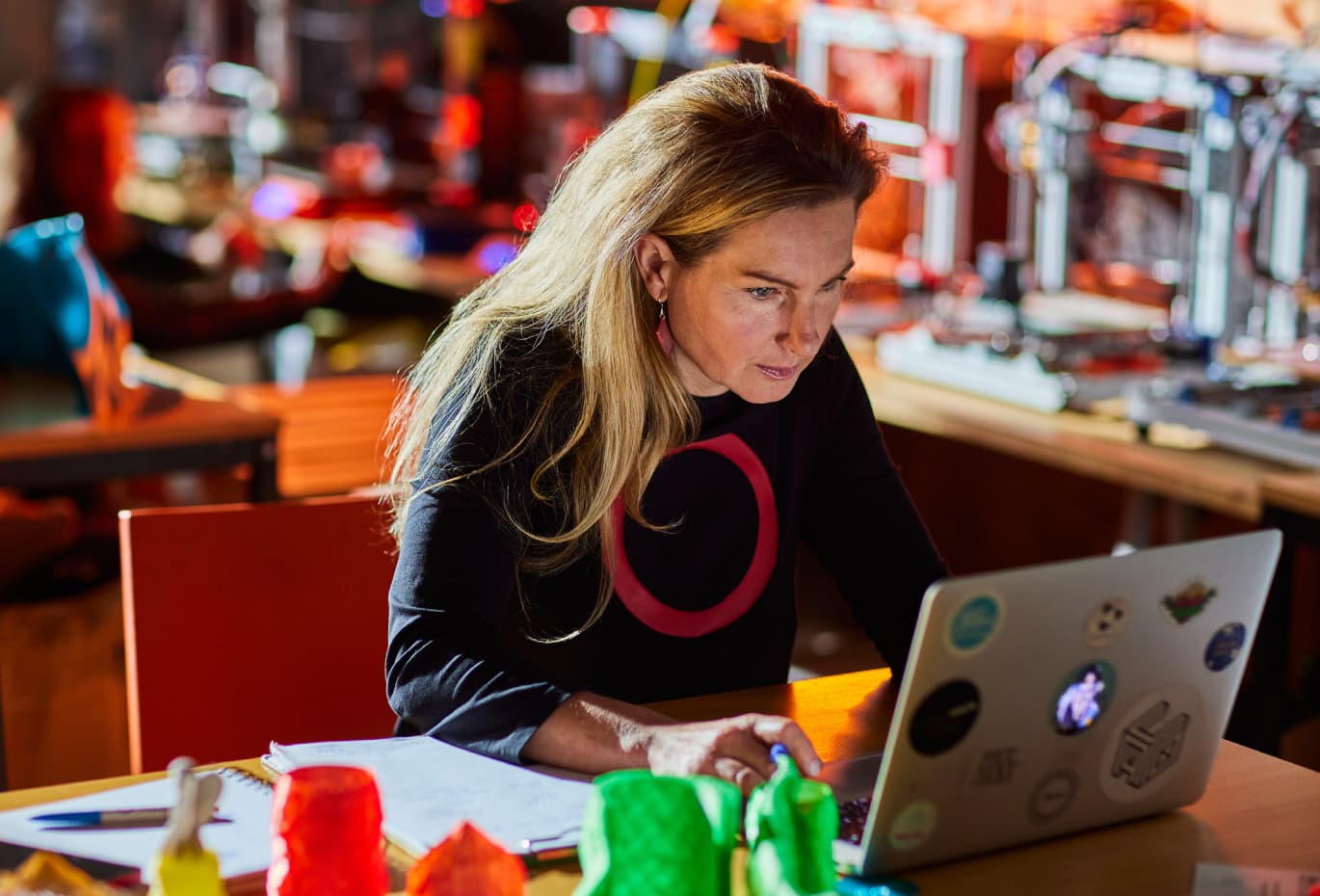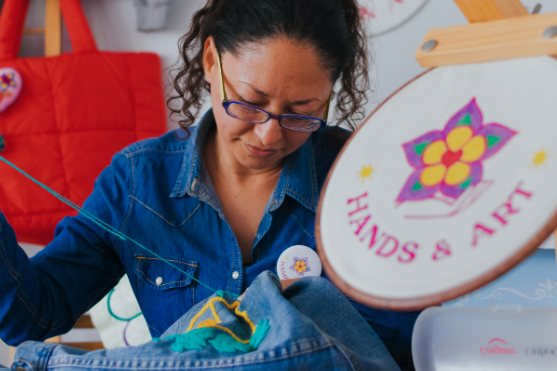

Striving to Thrive: Czech MSEs in 2025
Whilst big business often grabs the headlines, one thing is true the world over: no economy succeeds without a thriving small business sector. Micro and small businesses (MSEs) are arguably the backbone of any economy. They contribute to job creation, economic growth, and innovation. They also create the local shopping centers and meeting points that not only support a more prosperous economy, but also contribute to healthier local communities.
In November 2022, Strive Czechia, a $5.5 million new initiative supported by the Mastercard Center for Inclusive Growth launched, bolstering the digital and financial resilience of 250,000 small businesses – particularly female business owners and those from minority ethnic backgrounds. We collaborated on the Barometer in 2022, 2023, and 2024 – this latest report is the fourth edition which delves deeper into MSEs, cybersecurity, and the enterprise ecosystem in the Czech Republic.

11 lessons from the 2025 Barometer
-
Entrepreneurs are financially stable but have limited safety nets
Many MSE owners depend entirely on their business for income but lack the financial buffers needed to weather economic shocks. In fact, 77% of MSE owners rely on their business as their primary source of income. Despite this, 1 in 5 have no financial runway if their business were to stop generating revenue – a trend consistent with the findings of the previous Barometer in 2024. Among those with reserves, only 20% can sustain operations for a year. Factors like gender, business size, location, and age play a significant role in these disparities.
This data also aligns with broader trends observed in entrepreneurs’ ability to handle unexpected expenses. In the first Barometer in 2022, 1 in 5 entrepreneurs reported being unable to meet an emergency expense, a number that rose to 1 in 4 by the third edition in 2024
-
Most Czech MSEs seek stability over aggressive growth
Entrepreneurs prioritize stability and are increasingly looking at moderate growth over rapid expansion, signaling an overall cautious business climate. This year’s study shows a positive trend, with fewer businesses wanting to remain the same size and more businesses expecting moderate growth. 43% want their business to remain the same size compared to 50% from the Barometer 2022 report, and 41% of enterprises are aiming for moderate growth, up from about 33% in 2022. Overall, only 9% of Czech MSEs are looking for rapid expansion, suggesting a general low risk appetite, a trait that is emphasized across other aspects such as the willingness to take on external credit. Interestingly, younger businesses operating for 6 years or less are the likeliest to want to grow rapidly (17%) than MSEs aged 7 – 12 years or 13 years and older (7% and 3%).
-
Entrepreneurs want support services like technology and business training but do not actively seek them out
Despite recognizing the value of training, 1 in 2 entrepreneurs did not access any support services in the past year. Among those who accessed support, most sought-after services include business mentoring (24%), financial training (20%), and cybersecurity training (16%). Micro and small businesses are more likely to report accessing these various forms of support as important, compared to solopreneurs.
When asked about what would be helpful in the future for their businesses, 47% want better access to technology, while 40% want technology training, reiterating that entrepreneurs value these skillsets but are not actively accessing ways in which they can be built.
-
Women entrepreneurs continue to face work-life balance issues and societal barriers
As previous Barometers have repeatedly highlighted, women-led MSEs in Czech continue to juggle family responsibilities, facing societal biases, and professional discrimination, making it harder to scale their ventures. Near 6 in 10 women report family commitments as a major challenge, and 1 in 2 struggle with work-life balance. 44% cite societal biases and lack of trust in their capabilities, and 38% experience professional discrimination. Nearly half believe men have an advantage in running a business.
Repeatedly, we see that the burden of managing domestic duties continues to fall disproportionately on women. Reports state that, on average, women globally spend 2.7 more hours per day on unpaid care work, compared to men2 . Unsurprisingly, women entrepreneurs of all ages are more likely to agree that men have an advantage in running a business in Czechia (59% of women agree compared to 37% of men), highlighting that the awareness of a gender gap persists across generations of women.
-
Creating tailored support with a gender-lens, as well as nudging utilization, can help women-led Czech businesses grow and thrive
Women are 1.3 times more likely to be solopreneurs than men. They are also more likely to report not accessing any support services, than men-led enterprises (53% vs 49%). Providing them with the tools to tap into support pathways and appropriate skill-building can help these businesses make that challenging transition from solo to micro, and eventually small enterprises. We also see the need for this support come through in the fact that womenled enterprises are less likely to set aside a budget for digitization, and also seem to deprioritize access to technology-related support. Leveraging avenues of support services that women prefer more than men, such as accessing peer groups and networking, access to finance and other human resource/ business training could be an entry way to build women entrepreneurs’ capacity.
-
Loan access remains a challenge, despite high approval rates
Czech entrepreneurs continue to be wary of debt and external finance. Willing MSEs struggle to access financing due to complex procedures and restrictive requirements, even though most applications succeed. Only 20% of entrepreneurs applied for loans in the past year, continuing the trend from Barometer 2022. Among those who applied, 70% were successful, but 41% cite prohibitive terms, and 38% cite collateral requirements as barriers. Previous Barometer reports have highlighted the need for awareness building of external finance options, both private as well as state-provided, which continues to hold true based on the numbers reported this year.
-
Digital transformation is a priority, but investment remains minimal. Cost, time, and experience remain constraints for MSEs
While entrepreneurs recognize the need for digital tools, investment remains low due to budget and other constraints. According to the Barometer 2023, 3 in 5 MSEs believe technology adoption is crucial to their business’ future success. However, in this study we see that 45% of MSEs plan to allocate only 1-5% of their budget to digitization in 2025. A very small subset of only 5% plan to invest more than 10% in digital tools, throwing a spotlight on the bridge between prioritization and putting into actual practice. Cost and time constraints (23%) and lack of funding (22%) are key barriers to digital adoption, continuing in line with observations from the previous Barometers as well.
-
Similarly, cybersecurity awareness is rising, but many businesses still underinvest
MSEs acknowledge cybersecurity risks but often deprioritize security due to budget and expertise gaps. 7 in 10 use antivirus software, and 6 in 10 update software regularly and use two-factor authentication. Interestingly, 30% have experienced a cybersecurity incident, yet 10% express no concern about cyber risks, highlighting the need to create awareness about the urgency and need to prioritize cybersecurity in today’s increasingly digital environment. 40% are only willing to invest less than 500 CZK per month in cybersecurity tools.
-
Affordability and expertise are key barriers to better cybersecurity practices
Many MSEs lack the budget, skills, or urgency to improve their cybersecurity. 31% cite cost as a major barrier, while 26% lack the necessary expertise. 27% don’t see cybersecurity as a priority, and 21% lack the time to address it. When asked what would help adopt better cybersecurity practices, entrepreneurs report the need for availability of affordable tools (40%), training programs (35%), and expert support (31%) as key asks.
-
Prague-based entrepreneurs show stronger digital engagement and business stability compared to other regions
Entrepreneurs in Prague stand out in terms of business stability, digital engagement, and confidence. While 20% of Prague-based MSEs report having other sources of income, they are the most likely to report higher revenues, with 12% earning over CZK 12.5 million. Additionally, 26% of Prague MSEs allocate more than 6% of their budgets to digitization, compared to 20% in other regions, and 70% prioritize cybersecurity. In contrast, regions like Northwest and Moravian-Silesian are slower to adopt digital tools, with a quarter or less of MSEs currently not implementing any cybersecurity measures. These regions also report lower business confidence, for example, just 28% of Moravian-Silesian entrepreneurs report increased confidence in running their business, compared to 39% in Prague. This highlights a clear gap in both digital adoption and overall business development across regions.
-
Overall, entrepreneurs perceive an unchanged business environment, with limited improvement in support services
Overall, most entrepreneurs feel the business ecosystem has not changed much in recent years. 56% believe there has been no change in the availability of business support services. Although over a third report perceiving no change in the business environment, about 22% report an improvement. 57% also report no change in their confidence in running a business. Understandably, size of business, location, as well as age of business and entrepreneur impact overall perception. Micro and small businesses are more likely to report that availability of support services has increased than solopreneurs (34% vs 21%), and younger businesses are more likely to report an increase here as well, indicating how the perception of the ecosystem varies on multiple factors.

Key insights from the 2024 Barometer
-
Czech entrepreneurs are wary of debt and external finance
Around 40% of entrepreneurs don’t feel that an external loan is suitable for them, and over a third of entrepreneurs report a preference to remain debt- free. This corroborates existing research showing that 40% of Czechs would not consider taking out a loan for their businesses, a figure that rises to 67% among those aged 55 and above.
-
This wariness translates into only a few MSEs attempting to access external finance, and might be exacerbated by challenges in the application process
Only a quarter of entrepreneurs have attempted to access private financing, and those that do report significant barriers, ranging from prohibitive interest rates (27%) to issues with the loan size offered (24%), and stringent collateral requirements (22%).
-
Successful applications are not the end of the story, with an alarming nine in ten entrepreneurs who have taken a loan viewing it as a burden
Men are more likely to see the loan as a burden than women (18% vs 10%), as are older entrepreneurs’ (24% of those below 34, vs 42% of those 35–54 and 32% above 55 years). Nearly 1 in 5 explicitly regret taking the loan, and close to a third of entrepreneurs report taking an additional loan to help with existing business loan payments.
-
A lack of awareness of sources for financing might be contributing to the wariness of external finance
1 in 5 Czech MSE entrepreneurs rate their awareness of bank loans as poor, and 2 in 5 rate their awareness of government sources of capital as poor. Education levels and age also play a role in the types of financing entrepreneurs are aware of, for example, 47% of entrepreneurs with less than a high school diploma report poor awareness of bank loans, in contrast to only 16% of those with a high school diploma or more.
-
State support is a similar story, showing poor awareness and low uptake across entrepreneurs
Close to 40% of entrepreneurs report poor awareness of government financial support, and only 30% report attempting to access such support in the past three years. Challenges on the government side of things include complex application procedures (38%), strict eligibility criteria (35%), and extended approval timelines (33%).

Key insights from the 2023 Barometer
-
A majority of Czech MSE owners would not recommend running a small business
We start with sobering news: Czech small business entrepreneurs are relatively unenthusiastic about their line of work. By a range of measures, our last Barometer uncovered that running a small enterprise was not for the faint-hearted. In 2022, more than 1 in 5 MSEs anticipated a decrease in revenue and investments, with a slim prospect of employment growth. This time we thought we’d ask entrepreneurs straight out if they would recommend running an MSE. Using a tool called the Net Promoter Score (NPS), which provides a gauge of satisfaction, Czech MSE owners give a low score of -23.
-
The technology “trust gap” may be the single biggest challenge to increasing digitalisation
Fewer than half (47%) of MSE owners trust tech to assist them in making important business decisions (e.g. financial planning, inventory management) and only a third trust it to keep sensitive information secure. When it comes to data security young business owners are more likely to trust technology: 61% of the 18- to 24-year-olds compared to a meagre 22% of those above 64. Larger MSEs are also more likely to be enthusiastic about technology than their smaller counterparts. Understanding how to build trust with MSEs, and discovering which types of technology they trust, will be critical to the future adoption of digital tools and services.
-
Word of mouth is the main driver of technological adoption
More than half of business owners rely on friends or family as their main source of ‘reliable’ information about digital technology. It will be important to find ways to encourage MSE owners to seek out and use technical third-party advice beyond their immediate circles so that they adopt the right technology. A high level of peer-to-peer trust presents an opportunity to promote early adopters of technology as role models and mentors within their networks.
-
Women-led MSEs are held back by the demands of their unpaid labour
The burden of managing domestic duties continues to fall disproportionately on women. On average, women globally spend over 2.4 more hours per day on unpaid care work, compared to men. In Czechia a greater proportion of female business owners than male business owners (70% compared to 56%) report that they must balance their business with running their family life. Difficulty in maintaining an appropriate work-life balance was identified by women as among their top three challenges in running a business (alongside lower earnings than men and lower confidence in their ability to succeed).
-
Women might be ‘forced’ to become business owners due to a lack of other options
Women, especially those returning to the labour market after childbirth, may be facing a double-edged sword when it comes to smallscale entrepreneurialism. They suffer greater challenges in starting a business, and also have fewer opportunities to find paid employment elsewhere. We found that close to half of the women-led businesses (45%) were started between the ages of 31 and 45, while half of male-led businesses were started between the ages of 21 and 30. This is most often attributed to having fewer formal alternatives (including sufficiently flexible employment contracts) after maternity leave.

Key insights from the 2022 Barometer
-
Business performance of Czech MSEs is currently mixed
While 2 in 5 businesses report increased revenue, a third report decreased revenue in the last 12 months. MSEs are as likely to report a reduced ability to plan finances over the previous twelve months as they are an improvement. Correspondingly half of all businesses said that their stress levels had increased. MSEs reporting a more negative performance are more likley to be led by either women or older entrepreneurs.
-
Czech MSEs report higher than average capacity to deal with economic shock
Only a fifth of MSEs would find it ”difficult“ to cover an emergency expense of 1/20th of Gross National
Income per capita (~51k CZK). According to similar data collected by Findex this compares to over a third of people in Czech more broadly.15 Nearly 3 in 5 mentioned savings as a primary source to cover an emergency
expense. -
Nonetheless, MSEs report a significant financing gap
Nearly a fifth of the MSEs we spoke to reported that they had used a credit facility or loan in the last 12 months. The purpose of these loans was mainly for working capital (51%), expanding business operations (29%) and investments (23%). Current usage of credit or loans is much lower than their stated credit appetite. Close to two-thirds of the MSEs (64%) answered ”yes“ when asked whether they would like to take a loan to cover business needs or to grow their business.
-
Size matters. Micro, and particularly solopreneurs, are relatively disadvantaged
Of the three groups we studied, small businesses report better outcomes in comparison to micro and solo enterprises over each of the business performance measures we looked at. Enterprises categorized as small are also more tech savvy, being both more confident in their use of technology and more likely to believe technology is critical for their future success.
-
Gender matters. Women-led businesses also appear to be disadvantaged
Compared to their male-led counterparts, womenled MSEs reported weaker business performance in the previous 12 months. Our findings show female entrepreneurs to have lower levels of financial resilience, reduced access to digital payment services and access to loans, as well as being less confident in their use of technology. Structural barriers such as lack of prior access to and usage of different types and sources of technology are likely to contribute to such outcomes, in addition to challenges in balancing household and care duties. Women-led businesses believe that, to accelerate their business performance, there is an urgent un-met need to access training on finance, management skills, digital skills, and access to technology.


